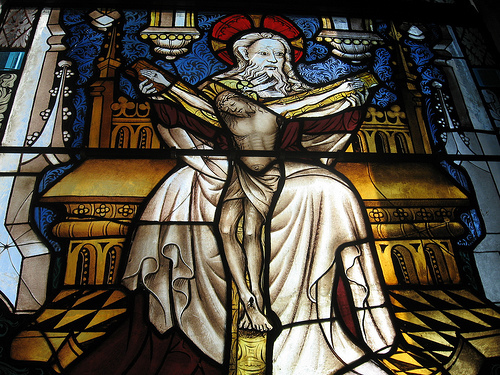We run our website the way we wished the whole internet worked: we provide high quality original content with no ads. We are funded solely by your direct support. Please consider supporting this project.

Was Jesus Abandoned by the Father on the Cross?
As Jesus hung on the cross, he cried, “Eli, Eli, lema sabachthani?” (Mt 27:46). This is the cry of our God who stooped to the furthest possible depths to experience his own antithesis, as the all-holy God becomes the sin of the world (2 Cor 5:21) and the perfectly united God becomes the curse of our separation from God (Gal 3:13).
Not surprisingly, this cry has always troubled theologians who were invested in preserving the classical understanding of God’s impassibility and immutability. How could God the Son truly experience abandonment from the Father if the Trinity is “above” suffering and “above” experiencing any kind of change? Hence, to insolate the divinity of Jesus from any suffering and change, the general way classical theologians have interpreted Jesus’ desperate cry was to argue that it arose out of his experience as a full human being, not his divinity. Among other problems, this interpretation calls into question the unity of the person of Jesus Christ and thus borders on Nestorianism. Not only this, but if God himself did not experience change and suffering on the cross, one is hard pressed to see how Jesus’ experience of change and suffering actually reveals God—let alone constitutes the quintessential revelation of God!
In more recent times a number of scholars have argued that Jesus was quoting the first line of Psalm 22. Since Psalm 22 ends on a note of hope in God’s redemption (vss. 22-31), some have suggested that Jesus’ apparent cry of despair might actually have been an expression of confidence that his abandonment was going to be temporary and that his Father would ultimately vindicate him.
But even if Jesus was alluding to the entire Psalm and was confident he would eventually be restored, this does not negate the truth that he was genuinely experiencing God-forsakenness and was, in his supremely tormented state, even experiencing confusion as to why it was happening.
It is not merely that Jesus experienced genuine God-forsakenness, he was in fact genuinely forsaken, as a number of theologians and NT scholars have emphasized in recent years. James Edwards, for example, says that on the cross, “Jesus is wholly forsaken and exposed to the horror of humanity’s sin.” This horror, he adds, is “so total that in his dying breath he senses his separation from God.”
At the same time, the unity of the Trinity could not be temporarily severed. If God’s eternal essence is the perfect loving unity of the Father, Son and Holy Spirit, then any suggestion that this perfect unity could be “severed,” even for a moment, would, by definition, entail that the Trinity could conceivably cease to exist. At the very least, if the “innermost life of the Trinity” could conceivably be threatened, the union of the three Persons must be understood to be a contingent, rather than a necessary, reality. And in this case, we cannot claim that God’s very essence is the loving union of the three Persons.
We can simultaneously affirm the ongoing, unbroken unity of the Trinity while also affirming the authenticity of Christ’s cry, on the other, if we simply remember that that this separation was entered into by all three divine Person’s out of love for human kind and for one another. As paradoxical as it sounds, the anguished separation of the Father and the Son on the cross constitutes the quintessential expression of the loving unity of the Father and the Son. Indeed, the unsurpassable cost of this divine separation expresses the unsurpassable perfection of the love of this divine union.
Perhaps the best way of thinking about this is to distinguish between the love and unity that the three divine persons experience, on the one hand, and the love and unity that defines God’s eternal essence, on the other. We could say that on the cross, the former was momentarily sacrificed as an expression of the latter. That is, the three divine Person’s sacrificed their previously uninterrupted experience of perfect love and union in order to express the perfect love and union that defines them as God.
Image by jlwelsh via Flickr.
Category: Q&A
Tags: Abandonment, Cross, Jesus, Love, Trinity
Topics: Atonement and The Cross
Related Reading

How to Produce the Fruit of the Spirit
When the New Testament tells us to be loving, joyful, peaceful, kind and so on, it is not giving us a new set of behaviors that we are to strive to accomplish. Striving to attain them means nothing if they are sought as ethical ideals or to meet a set of religious rules. They have…

Love That Keeps On Giving
In English, we have one word for love. In ancient Greek, there were four different words that we can translate as “love.” And each has a different meaning. Let’s consider each briefly. Storge—referred to a person’s affection for something. When we say we love our car or a person’s smile or another’s ability to sing,…

God’s Dream for the World
The future doesn’t yet exist—which is why it’s future instead of the present or past—this doesn’t mean I’m claiming the future is wide open. To the contrary, it’s very clear from Scripture that God has a great plan for the future, and this plan steers the course of history by setting limits on what can…

The Cross is Revelation and Salvation
The way Christ saved us from the curse of the law was “by becoming a curse for us” (Gal. 3:13). So too, the way Christ freed us from the condemnation of sin and enabled us to “become the righteousness of God” was by becoming sin for us (2 Cor. 5:21). Getting this point is crucial…

The Extremity of God’s Love
In response to questions he has received about whether Jesus was actually separated from the Father on the cross, Greg fleshes out his perspective on this. The love that unites the Trinity is the very same love that resulted in the separation of the Father from the Son. This separation actually expresses the great love…

Reflecting on the Lord’s Prayer
Jesus begins the instruction on prayer (Matthew 6:9-13) by telling his disciples to pray for the Father’s name to be “hallowed,” for his kingdom to come, and for his will to be established on earth as it is in heaven. He is, in effect, telling them to pray for the fulfillment of everything his ministry,…
